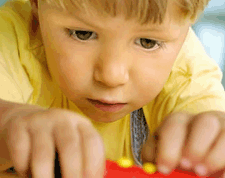المقالات
Importance of Primary Teeth

Because primary teeth, also called baby teeth, are eventually replaced by permanent teeth, many people don't realize that they are, in fact, very important for a child's long-term dental health.
Normally, some of the primary teeth remain in the mouth until a child is eleven or twelve. During this time, they serve as space maintainers and ensure that the permanent teeth are properly aligned as they grow into the mouth. Early loss of primary teeth often causes misalignment of the permanent teeth and may even alter normal facial development. Expensive orthodontic solutions may be necessary to correct these problems.
Children need strong, healthy teeth to chew their food. Cavities and tooth loss can make it impossible for a child to eat properly, which affects her overall level of health. Speech development can also be affected by premature tooth loss. In combination, these problems may lower a child's self-esteem during her important formative years.
As you can see, primary teeth are critically important for a child's health and development. It's important to keep them in the mouth as long as possible by practicing excellent oral hygiene and treating problems early.
